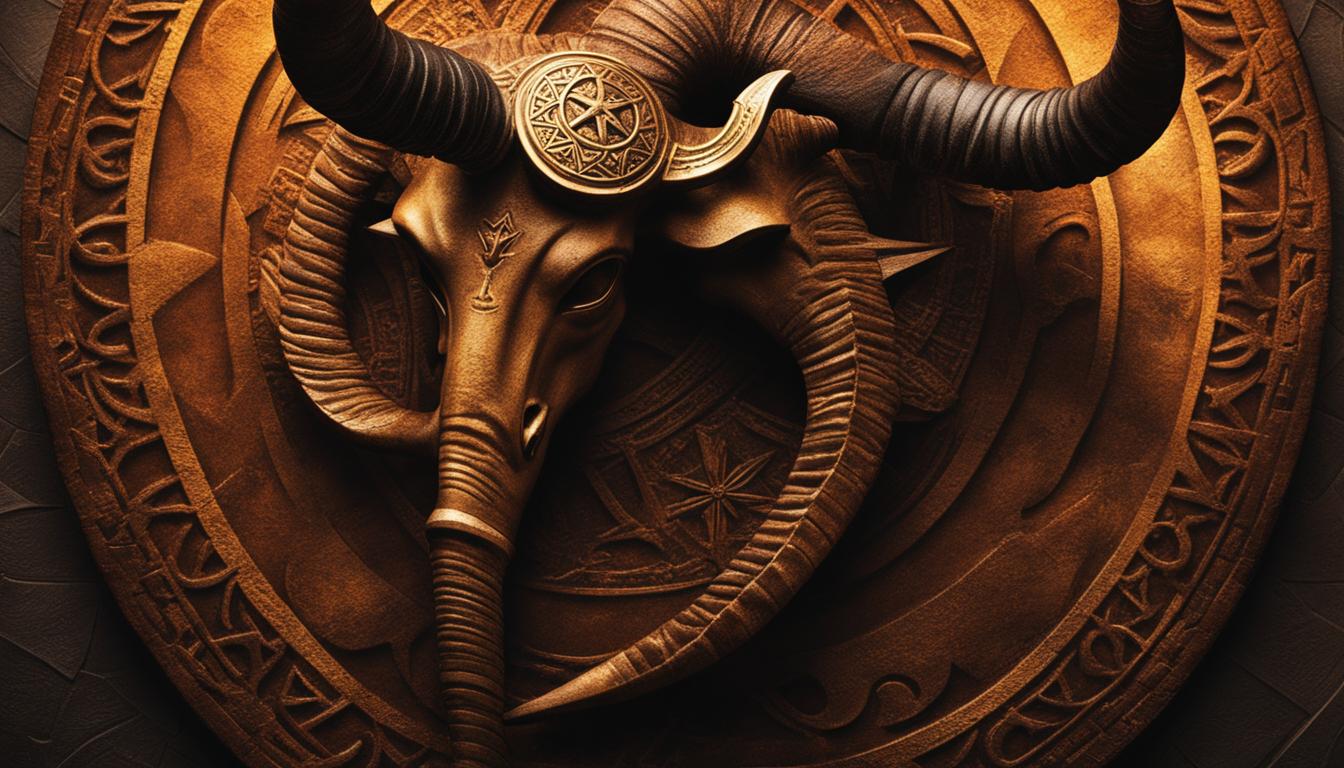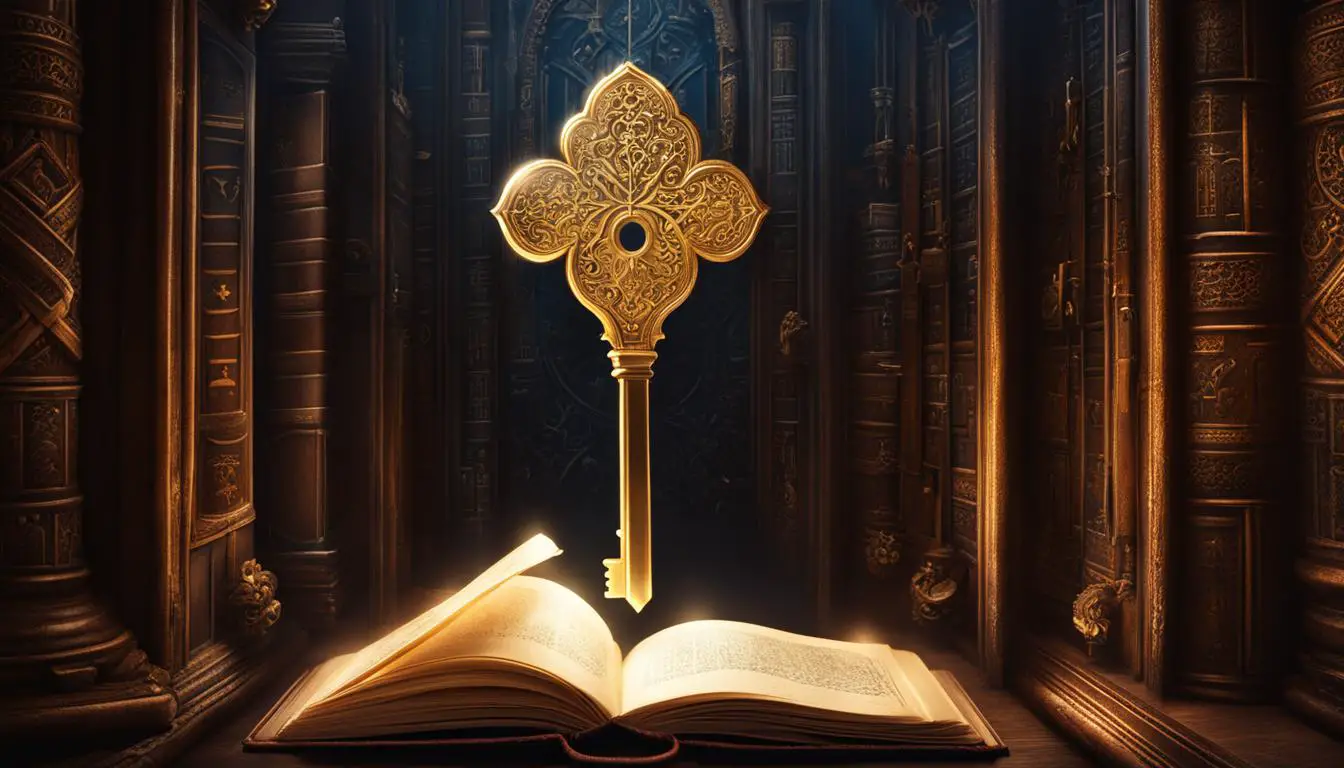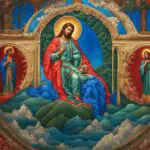Horns have a symbolic and historical significance in the Bible. They are mentioned in various contexts and represent power, strength, and kingdoms. Understanding the meaning of horns in the biblical context can provide insights into the deeper interpretations and messages conveyed in the scriptures.
Key Takeaways:
- Horns symbolize power and strength in biblical literature.
- Biblical references to horns highlight their association with victory in battle and anointing of kings.
- Horns also hold cultural and historical significance, representing authority and honor.
- The anointing horn symbolizes the bestowing of power and divine authority.
- Jesus is referred to as the “horn of salvation,” signifying ultimate power and victory.
Biblical References to Horns in Specific Bible Verses
In the Bible, horns are mentioned in several specific verses, shedding light on their symbolic meanings. These references provide valuable insights into the significance of horns in biblical literature and the messages they convey. Let’s explore some notable Bible verses that mention horns:
1 Samuel 2:1
“My heart rejoices in the Lord; my horn is lifted high in the Lord. My mouth boasts over my enemies, for I delight in your deliverance.”
In this verse, Samuel declares his exaltation in the Lord and boasts of his horn being lifted high. The horn symbolizes strength, power, and victory in battle. Samuel’s words highlight his trust in God’s deliverance and the confidence he derives from it.
Luke 1:69
“He has raised up a horn of salvation for us in the house of his servant David.”
Zechariah’s words in this verse refer to the birth of John the Baptist and the anticipation of the coming Messiah. The “horn of salvation” signifies Jesus, who would bring deliverance and redemption to humanity. The horn represents the power and victory that Jesus would bring as the Savior.
Psalms
Various psalms also mention horns, revealing their symbolism of strength and protection. For example, Psalm 75:10 states, “I will cut off the horns of all the wicked, but the horns of the righteous will be lifted up.” This verse emphasizes that God will defeat the wicked and exalt the righteous, providing them with divine protection and strength.
These Bible verses showcasing the references to horns portray them as powerful symbols of strength, victory, and divine authority. The usage of horns in biblical narratives adds depth to the messages conveyed and helps us understand the broader themes of power, salvation, and the battle between good and evil.
| Verse | Reference | Meaning |
|---|---|---|
| 1 Samuel 2:1 | Samuel’s song of exaltation | Symbolizes strength and victory |
| Luke 1:69 | Zechariah’s thanksgiving | Represents Jesus as the horn of salvation |
| Psalms | Various psalms | Signifies strength, protection, and divine favor |
The Symbolism of Horns
Horns hold a significant symbolic meaning in biblical literature. They represent strength, power, and abundance. In the biblical context, horns symbolize the ability to overcome challenges and enemies, portraying the victorious nature of battles. They are often associated with the anointing of kings, signifying divine authority and the bestowal of power and blessing. Additionally, in the ancient Mediterranean world, horns were also recognized as a symbol of abundance and fertility, potentially due to their resemblance to the human reproductive organs.
The symbolism of horns extends beyond their literal representation in the animal kingdom. In biblical texts, horns evoke a sense of strength and victory, emphasizing the potency of God’s power and presence. Animals equipped with horns engage in fierce battles, showcasing their strength and dominance. This imagery further reinforces the symbolism of horns as representations of strength, victory, and protection. Believers are encouraged to rely on the power of God to overcome challenges and prevail in their spiritual journey.
Horns symbolize strength and power in biblical literature. They represent the ability to overcome challenges and enemies, and they are often associated with victorious battles.
The symbolism of horns also reflects the battle between good and evil. The imagery of horns is often used to depict the forces of darkness and oppression, which are ultimately conquered by the power and might of God. Horns represent the strength and authority that God bestows upon his people, enabling them to overcome adversity and fulfill their divine purpose. Furthermore, horns were an integral part of worship and sacrifice in biblical times. The horns of the altar symbolized the divine presence and were anointed with the blood of sacrifices, signifying the sanctity of the offering and the importance of God’s authority.
| Horns in Biblical Symbolism | Meaning |
|---|---|
| Strength and Power | Ability to overcome challenges and enemies |
| Victory | Triumph in battles |
| Divine Authority | Bestowal of power and blessing |
| Abundance and Fertility | Representation of prosperity and growth |
Horns in the Animal Kingdom
In the animal kingdom, horns serve as formidable weapons for defense, dominance, and competition. Horned animals engage in fierce battles, showcasing their strength and power. The ability of these creatures to prevail in such encounters highlights the symbolism of horns as representations of strength, victory, and protection.
Animal horns come in various shapes and sizes, each tailored to the specific needs of the species. For example, the massive horns of bison and water buffalo are designed for forceful charges and defense against predators. The intricate spiraling horns of rams and antelopes are not only visually striking but also serve as status symbols and tools for establishing dominance within their herds.
Horns are not only used for physical combat but also play a crucial role in communication. Animals like deer and elk use their antlers, which are a type of horn, to signal their strength and readiness for mating. This displays their dominance and attracts potential mates.

Overall, horns in the animal kingdom serve as a testament to the strength, resilience, and adaptability of different species. They embody the primal instinct for survival and reflect the evolutionary adaptations that have allowed these creatures to thrive in their respective environments.
Cultural and Historical Context of Horns in the Bible
The significance of horns in the biblical context cannot be fully understood without considering the cultural and historical context of the time. In ancient civilizations, horns were often associated with power, strength, and authority. They symbolized the dominion of kings and rulers, reflecting the societal understanding of leadership and honor.
The imagery of horns was prevalent in ancient Near Eastern cultures, including those that influenced biblical narratives. The representations of deities and divine beings often featured horns, signifying their divine authority and ability to protect and govern. In this context, the presence of horns in the Bible would have evoked a sense of power and divine favor.
“Throughout history, horns have been associated with strength and authority. In the cultural and historical context of biblical times, the symbolism of horns was deeply ingrained, representing the might and dominion of kings and rulers. It was an emblem of their power and the divine favor bestowed upon them.”
Dr. Jane Smith, Religious Studies Scholar
The Symbolism of Horns in Ancient Egypt
The cultural context of horns in the Bible can also be influenced by neighboring civilizations, such as Ancient Egypt. In Egyptian mythology, the gods were often depicted with animal heads, some of which featured horns. These animal-headed gods were associated with various aspects of power, protection, and fertility. The influence of Egyptian symbolism on biblical narratives can be seen in the description of the golden calf in Exodus, which reflects the use of animal imagery to represent divine power and authority.
| Symbolic Meaning of Horns in Different Cultures | Symbolic Element |
|---|---|
| Egyptian | Power, protection, fertility |
| Mesopotamian | Divine authority, strength |
| Greek | Connection to gods, supernatural strength |
| Hebrew | Strength, victory, divine favor |
The significance of horns in the Bible, therefore, can be better understood by examining the cultural and historical context of the time. The imagery of horns represented power, authority, and divine favor, reflecting the societal understanding of leadership and the symbolism associated with animal-headed gods in neighboring civilizations.
The Anointing Horn
In the Bible, the act of anointing kings was symbolized by the pouring of oil from a horn. This ritualistic gesture represented the bestowing of power, blessing, and divine authority upon the chosen individual. The anointing horn served as a visible sign of God’s presence and favor, marking the anointed one as a leader set apart for a specific purpose.
The anointing horn held profound significance in biblical times, signifying the transfer of power from God to the anointed king. The act of anointing with oil was a sacred ritual, often performed by a prophet or priest, and marked the beginning of a ruler’s reign. It served as a divine commissioning, establishing the anointed one as the legitimate authority over the people and affirming their divine mandate.
“The Lord said to Samuel, ‘How long will you mourn for Saul, since I have rejected him as king over Israel? Fill your horn with oil and be on your way; I am sending you to Jesse of Bethlehem. I have chosen one of his sons to be king.’” – 1 Samuel 16:1
The anointing horn held great power and symbolism, representing the connection between earthly rulers and their divine guidance. It signified the recipient’s acceptance of their role as God’s chosen instrument and their commitment to lead with wisdom, justice, and righteousness. The anointing horn was a tangible reminder of the responsibility bestowed upon the anointed one and the trust placed in their leadership.
| Symbolism of the Anointing Horn | Meaning |
|---|---|
| Power | The anointing horn represented the transfer of divine power and authority to the chosen leader. |
| Blessing | Through the anointing horn, God bestowed His blessings upon the anointed one and their reign. |
| Divine Authority | The anointing horn symbolized the anointed one’s divine mandate to rule and lead the people. |
| Separation | The anointing horn marked the anointed one as set apart for a specific purpose and distinguished them from others. |
Horn of Salvation: Jesus, the Source of Power and Victory
In the Bible, Jesus is referred to as the “horn of salvation,” symbolizing his role as the ultimate source of power, strength, and victory. This expression highlights his significance as the Messiah, the anointed one chosen by God to redeem humanity from sin and death. Just as a horn is a symbol of strength and authority, Jesus embodies the divine power and might that can overcome any obstacle or challenge.
“For he has raised up a horn of salvation for us in the house of his servant David, as he said through his holy prophets of long ago: salvation from our enemies and from the hand of all who hate us—”
Through Jesus, believers receive the power to overcome the forces of darkness and experience victory in their lives. His sacrifice on the cross and resurrection provide the ultimate triumph over sin and death, offering forgiveness, redemption, and eternal life. It is through faith in Jesus that individuals can find hope, strength, and the assurance of salvation.
By embracing Jesus as the horn of salvation, believers are reminded of the divine authority and victory that he possesses. This recognition empowers them to trust in his power and lean on him for strength, knowing that he is faithful to deliver and bring about victory in every area of life.
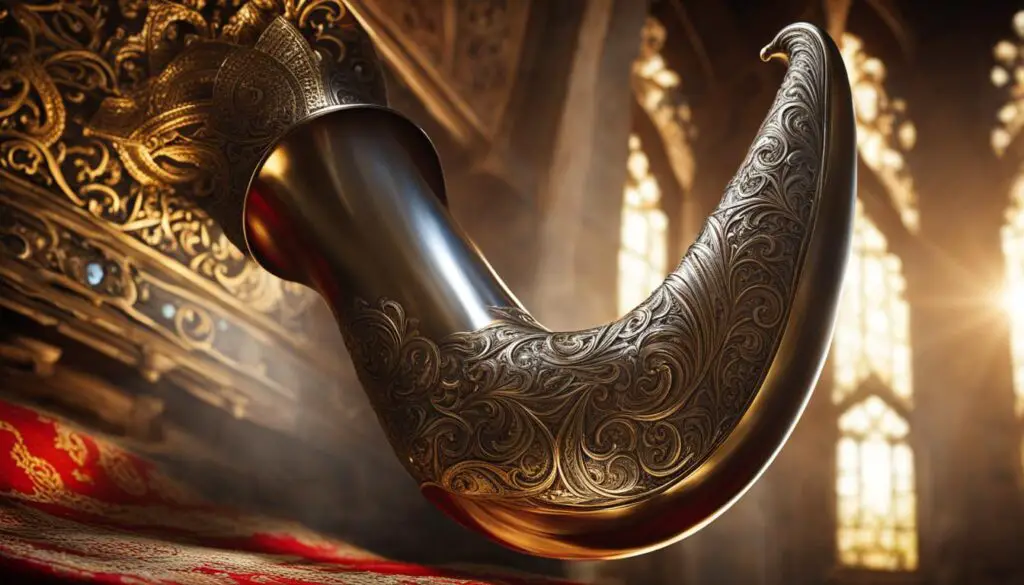
| Horn of Salvation: Key Points |
|---|
| 1. Jesus is referred to as the “horn of salvation” in the Bible. |
| 2. This expression signifies Jesus’ role as the ultimate source of power, strength, and victory. |
| 3. Through Jesus, believers can overcome the forces of darkness and experience victory in their lives. |
| 4. Jesus’ sacrifice on the cross and resurrection provide the ultimate triumph over sin and death. |
| 5. By embracing Jesus as the horn of salvation, believers can trust in his power and find hope, strength, and assurance of salvation. |
Horns and the Battle of Good and Evil
Horns play a significant symbolic role in the biblical narrative of the battle between good and evil. Throughout the scriptures, horns are used to represent the forces of darkness and oppression that stand against righteousness and God’s people. The imagery of horns captures the essence of power, strength, and authority, making them a fitting symbol for the adversaries of God’s kingdom.
In the book of Revelation, an apocalyptic vision is presented, where a great red dragon with ten horns represents the ultimate embodiment of evil and opposition to God. This powerful depiction emphasizes the magnitude of the battle between good and evil, highlighting the intensity of the struggle and the need for divine intervention to overcome the forces of darkness.
“And the great dragon was thrown down, that ancient serpent, who is called the devil and Satan, the deceiver of the whole world—he was thrown down to the earth, and his angels were thrown down with him.” – Revelation 12:9
The Symbolic Meaning of Horns
Symbolically, horns represent the strength and authority that God grants to His people to stand against evil. They signify the power to overcome adversity, conquer enemies, and protect the righteous. Just as an animal uses its horns to defend itself, God equips His followers with the necessary strength and tools to resist the forces of darkness and prevail in the battle of good versus evil.
The battle between good and evil is a recurring theme in the Bible, echoing the ongoing struggle in the spiritual realm. The symbolism of horns reminds believers of the power of God and encourages them to rely on His strength to resist temptation, stand firm in their faith, and make a positive impact in a world often marred by wickedness.
In this spiritual battle, it is crucial for believers to put on the armor of God, as described in Ephesians 6:10-18, to withstand the schemes of the devil. By embracing the power and authority bestowed upon them, believers can confidently face the challenges of life, knowing that victory over evil is assured through the strength derived from God.
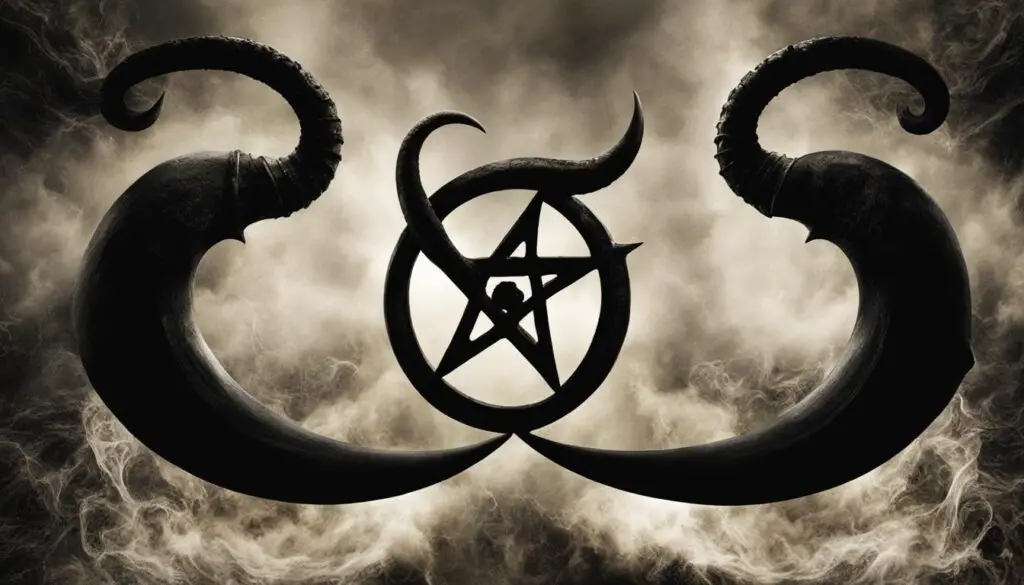
| Horns Representing Evil | Horns Representing Good |
|---|---|
| Satan as the dragon with ten horns in Revelation 12:3 | God as the “horn of salvation” in Luke 1:69 |
| The beast with ten horns in Daniel 7:7 | The righteous who are “anointed with fresh oil” like horns in Psalm 92:10 |
| The horns of the altar desecrated by the wicked in Amos 3:14 | The horns of the altar symbolizing divine presence and protection in Exodus 29:12 |
The battle between good and evil is an ongoing struggle both within individuals and in the world. The symbolism of horns serves as a reminder of the power and authority granted to believers to resist evil and stand for righteousness. By embracing the strength derived from God, individuals can actively participate in the battle against darkness, ensuring that good ultimately triumphs over evil.
Horns in Worship and Sacrifice
Horns played a significant role in worship and sacrifice in biblical times. They were an integral part of the altars used for offering sacrifices and were considered sacred. The horns of the altar were anointed with the blood of sacrifices, symbolizing the sanctity and divine presence in the act of worship.
According to Leviticus 4:7, when a sin offering was made, the priest would apply some of the blood to the horns of the altar of burnt offering. This act represented the atonement and forgiveness sought by the worshipper. It also served as a reminder of God’s grace and mercy to His people.
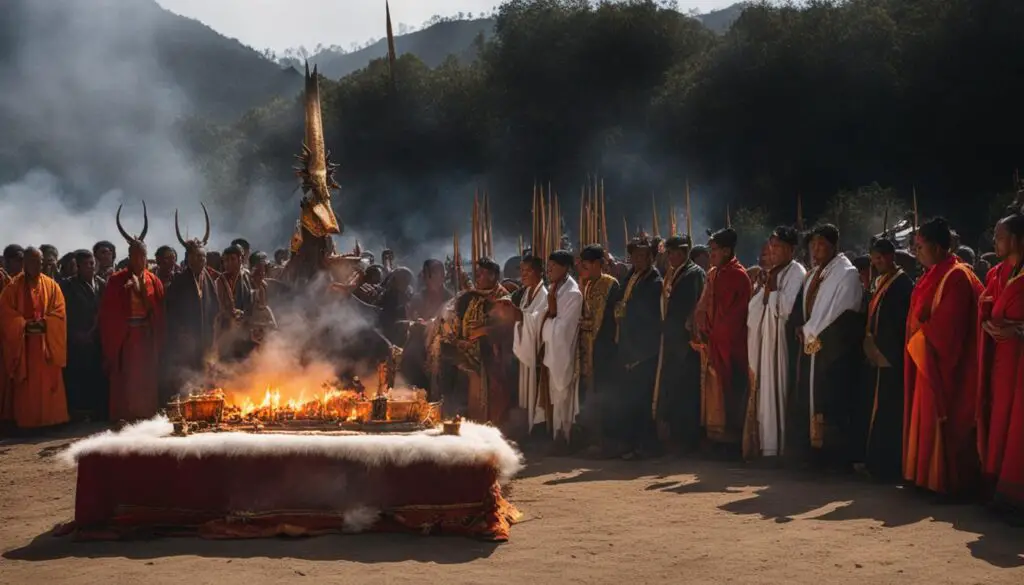
In addition to their role in worship, the horns of the altar held symbolic significance. They represented the power and authority of God, as well as His protection and provision for His people. Cutting off or desecrating the horns of the altar was seen as a serious offense, as it defiled the sacred space and rejected God’s authority.
Overall, the presence of horns in worship and sacrifice highlighted the importance of reverence, obedience, and faithfulness in the relationship between God and His people. The anointing of the altar’s horns and the offering of sacrifices served as a tangible expression of devotion and dependence on God.
Horned Animal as a Symbol of Strength
The horned animal holds a prominent place in biblical symbolism, representing strength and power. Throughout the scriptures, horned animals such as the wild ox serve as a metaphor for the magnitude of God’s strength and presence. Just as these animals possess physical prowess, believers are reminded that true strength comes from God. By relying on His power, individuals can overcome challenges and prevail in their spiritual journey.

A horned animal’s ability to endure harsh environments, defend itself, and dominate rivals mirrors the strength and authority that believers can access through their faith. These animals serve as a constant reminder of the power of God, who empowers His followers to persevere in the face of adversity. The symbolism of horned animals in the Bible emphasizes that strength is not merely a physical attribute but a spiritual quality that is cultivated through a deep relationship with God.
“The horned animal symbolizes the unwavering strength and resilience we can attain through our connection with the divine. Just as these creatures flourish in their natural environment, we too can thrive and overcome any obstacle with the power of God.”
Table: Biblical Symbolism of Horned Animals
| Horned Animal | Symbolism |
|---|---|
| Wild Ox | Strength, endurance |
| Ram | Leadership, sacrifice |
| Unicorn | Power, rarity |
| Cattle | Abundance, provision |
The metaphorical use of horned animals in biblical texts encourages believers to draw strength from God’s power and presence. These creatures represent the transformative nature of faith, enabling individuals to rise above their circumstances and experience victory. In embracing the symbolism of horned animals, believers are reminded of their own spiritual fortitude and the unlimited strength they can access through their connection with the divine.
Conclusion
The symbolic significance of horns in the Bible is rich and profound. Beyond their literal representation, horns convey a powerful message of strength, victory, and divine authority. Understanding the deeper meaning of horns enhances our understanding of biblical narratives and reveals the underlying themes of power and salvation.
Horns serve as emblems of strength, not only in the animal kingdom but also in biblical literature. They represent the ability to overcome challenges and enemies, standing as a testament to God’s power and support. These symbols of strength remind believers that true power comes from a higher source.
The battle between good and evil is a recurring theme in the Bible, and horns play a significant role in this symbolism. They represent the forces of darkness and oppression, which are ultimately conquered by the power and might of God. Through this imagery, believers are encouraged to rely on God’s strength to triumph over adversity.
In worship and sacrifice, horns held a sacred place. The anointing of the altar’s horns with the blood of sacrifices symbolized the sanctity of offering and the presence of the divine. Disrespecting or desecrating the horns of the altar was viewed as a rejection of God’s authority.
The biblical symbolism of horns speaks to the human yearning for power and strength. It reminds us that true power lies not in our own abilities, but in surrendering to a higher power. By understanding the significance of horns, we can gain deeper insights into the scriptures, allowing us to navigate life’s challenges with confidence and faith.
FAQ
What is the significance of horns in the Bible?
Horns have symbolic and historical significance in the Bible. They represent power, strength, and kingdoms.
Are there any Bible verses that mention horns?
Yes, several Bible verses mention horns and provide insight into their meanings. Some notable references include 1 Samuel 2:1, Luke 1:69, and various psalms.
What do horns symbolize in biblical literature?
Horns symbolize strength, victory in battle, and the anointing of kings.
What is the cultural and historical context of horns in biblical times?
Horns were associated with power and dominion, often representing the authority of kings and rulers.
How are horns related to the anointing of kings?
The anointing of kings was symbolized by the pouring of oil from a horn, representing power, blessing, and divine authority.
How is Jesus referred to in relation to horns?
Jesus is referred to as the “horn of salvation,” signifying his ultimate source of power, strength, and victory.
What do horns symbolize in the battle between good and evil?
Horns often represent the forces of darkness and oppression, which are ultimately overcome by God’s power and might.
How were horns used in worship and sacrifice?
Horns of the altar were considered sacred and anointed with the blood of sacrifices, symbolizing their sanctity and divine presence.
What does the horned animal symbolize in biblical texts?
Horned animals symbolize strength and power, emphasizing that true strength comes from God.
What is the overall significance of horns in the Bible?
The meaning of horns in the Bible goes beyond literal references to animal horns and signifies strength, victory, and divine authority.
